December 14, 2015, we received another lovely card from the Capuchin Poor Clares who manage the chapel at the St. Joseph and St. Rita Monastery in Alamo, TX, so we quickly made plans to celebrate Christmas Eve at their chapel.
Then, Thursday evening, we showed up early to savor every tasty morsel— the singing, the rosary, Mass, and lots of photo ops— thanks to the Sisters, the altar server, concelebrants Bishop Emeritus Reymundo Peña and Fr. Juan Manuel Salazar, and everyone eager for a very special Capuchin Christmas.
Christmas Eve homily
I see many happy faces here tonight and rightly so because Christmas is a time for joy. The greetings that we hear everywhere— “merry Christmas,” “feliz navidad,” even “happy holidays”— denote joy. Songs like Joy to the world, Angels we have heard on high, Singing alleluia, We wish you a merry Christmas— all of those stand for joy and happiness.
St. Luke’s narrative that we just heard includes people from all social levels and all walks of life. Just listen carefully to what he said.
Who was there? Just Mary and Joseph, a housewife and a carpenter. There was the innkeeper, a businessman who would not let them in; the humble shepherds, uneducated and working in difficult labor every day and night; the Magi who came from distant lands to worship and honor the newborn king; and King Herod, the politician appointed by the emperor who wanted to kill the Lord. So you can see that some were naughty and some were nice.
 Mary and Joseph received [Jesus] and wrapped him in swaddling clothes. The shepherds immediately went to see him but didn’t find him. The Magi came from far, far away. The innkeeper who was only about the money wouldn’t let them in. And King Herod, of course, as I mentioned earlier, wanted to kill him. So, again, some were naughty and some were nice.
Mary and Joseph received [Jesus] and wrapped him in swaddling clothes. The shepherds immediately went to see him but didn’t find him. The Magi came from far, far away. The innkeeper who was only about the money wouldn’t let them in. And King Herod, of course, as I mentioned earlier, wanted to kill him. So, again, some were naughty and some were nice.
There’s a quote on someone’s Facebook page that I saw this morning: “Every saint has a past, and every sinner has a future” [Oscar Wilde].
Every saint has a past, and every sinner has a future. Let’s look at some of the examples. There was St. Augustine who was a great, great sinner, who never went to church, who committed every sin in the book; but his mother kept praying for him. He was converted. There was Mary Magdalene who shed tears for her sins and went to wash the Lord’s feet. [Each] received God’s mercy for the rest of their lives.
We are all sinners except for the Blessed Virgin Mary. I often think of my own sins; but even if I try to repair them, I still have that inclination to want to sin. I’m sure all of us feel that way.
We want to be perfect. We want to love God. But the devil keeps tempting us because he’s jealous. He does not want us to reach heaven.
In his mercy Jesus came to save you and me. He forgives me; he forgives you. His birth makes salvation possible, and that’s why we rejoice. It wasn’t the fact that he was born. Joy comes from [knowing] that he was born in order to save us from our sins.
Every sinner can and should be saved because Christ came to save us all. As I mentioned a minute ago, St. Augustine had his mother pray and pray and pray until he changed. He was converted. He became a holy man. He became a bishop. He became a saint. And, as I mentioned before, Mary Magdalene committed every sin in the book; but, when she saw Jesus, she repented. She cried, and he gave her his mercy as she washed his feet. She was at the foot of the cross with Mary.
 You and I here tonight are Augustine of Hippo. You and I here tonight are Mary Magdalene. We have sinned, but we have repented. Otherwise, we would not be here. And we rejoice! We rejoice today because Jesus, the simple little baby in Bethlehem, today made our weaknesses his own so that we’re not weak by ourselves.
You and I here tonight are Augustine of Hippo. You and I here tonight are Mary Magdalene. We have sinned, but we have repented. Otherwise, we would not be here. And we rejoice! We rejoice today because Jesus, the simple little baby in Bethlehem, today made our weaknesses his own so that we’re not weak by ourselves.
Jesus accepted and embraced our weakness so that he would overcome; and, by overcoming that weakness, he could save us. He comes to us whether we are naughty or nice, just as he came to Mary and Joseph, to the shepherds, to the Magi, and to Herod.
Jesus sends our guardian angel to remind us of his birth just as he sent the angels to the shepherds to tell them that he had been born. Jesus sends the Church to tell us that Jesus was born and to tell us that he lived as the star guiding the Magi from distant lands.
Today we rejoice. We are back because the promise of Christmas is what we live for. We are not celebrating nearly a historical death: that Jesus was born some two-thousand fourteen, fifteen, twenty years ago. That’s historically true, but we are here more to celebrate the [reason] he was born.
He was born to be our savior. He was born to forgive our sins. And that’s why we’re happy because right here today, this Christmas day, we are beginning to taste the everlasting heaven: happiness that will be ours on Christmas forever; our salvation; our eternal union with God; our perpetual gaze at the face of our creator, our savior, and our God.
 Yes, we have reason to be happy. Yes, we have reason to enjoy. Yes, we have reason to say “glory to God in the highest and on earth peace to people of good will.” So today, tomorrow, and the next few weeks enjoy the Christmas lights. They remind us of the light of which Isaiah speaks in the first reading: The people who walk in darkness have seen a great light. You have brought them abundant joy [9:1-2].
Yes, we have reason to be happy. Yes, we have reason to enjoy. Yes, we have reason to say “glory to God in the highest and on earth peace to people of good will.” So today, tomorrow, and the next few weeks enjoy the Christmas lights. They remind us of the light of which Isaiah speaks in the first reading: The people who walk in darkness have seen a great light. You have brought them abundant joy [9:1-2].
They foreshadow the eternal light that is God. So rejoice. Enjoy the lights. Enjoy the Christmas songs. They’re like the choirs of angels who sang to the shepherds “glory to God in the highest” and with whom we will praise God in heaven forever.
Peace and close advice in the epistle: “Live temperately, justly, and be loved in this age as we await the blessed hope and the appearance of the glory of our great God and savior, Jesus Christ” [Titus 2:12-13]. So today, my brothers and sisters, be happy. Enjoy. Praise God.
May you all have a happy, holy, safe Christmas filled with his love, filled with his peace, and saying night and day “glory to God in the highest and on earth peace to men of good will” (Bp. Emeritus Reymundo Peña; December 24, 2015; transcribed audio recording).
January 4, 2016
We must rise up and value every instant of time that passes and is in our power. We must not waste a single moment. By divine grace we find ourselves at the beginning of a new year. This year, which only God knows if we shall see its end, must be used in reparation for the past and in preparation for the future (St. Pio).
January 23, 2016
The heavenly babe suffers and cries in the crib so that for us suffering would be sweet, meritorious, and accepted. He deprives himself of everything in order that we may learn from him the renunciation of worldly goods and comforts. He is satisfied with humble and poor adorers to encourage us to love poverty and to prefer the company of the little and simple rather than the great ones of the world.
This celestial child, all meekness and sweetness, wishes to impress in our hearts, by this example, these sublime virtues so that, from a world that is torn and devastated, an era of peace and love may spring forth. Even from the moment of his birth he reveals to us our mission, which is to scorn that which the world loves and seeks.
Oh, let us prostrate ourselves before the manger; and, along with the great St. Jerome who was enflamed with the love of the Infant Jesus, let us offer him all our hearts without reserve. Let us promise to follow the precepts which come to us from the grotto of Bethlehem, which teach us that everything here is vanity of vanities, nothing but vanity (St. Pio’s Christmas meditation, translated by Rega, 2005).
St. Joseph & St. Rita Monastery – 725 E. Bowie Avenue – Alamo, TX 78516-5500
Links of interest… Alamo, TX: Capuchin Poor Clares / cloistered life / monastery… Boxing Day… Christmas trials, mercy, & Padre Pio (more)… Christmastide: customs / days / foods / octave (more) / overview / twelfth night… Cloistered nuns want to pray for you… Las posadas & the 2nd Christmas novena (Dec 16-24)…
WP posts… Christmas blessings… Christmas scenes… Merry Christmas… Slice of heaven… Twelve candles
Filed under: chapels, Christmas, homilies, prayer, spiritual gifts | Tagged: building community, God's master plan, St. Joseph & St. Rita Monastery-Alamo TX, St. Joseph Chapel-Alamo TX |



























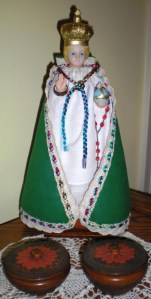


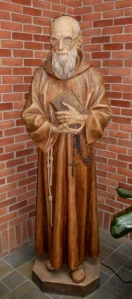
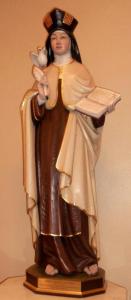

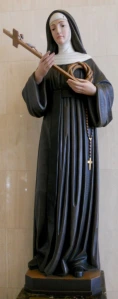


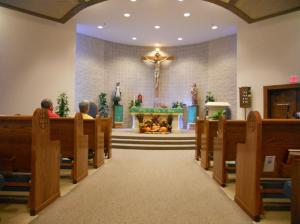
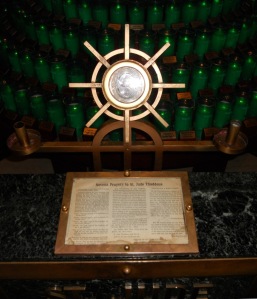









Leave a comment